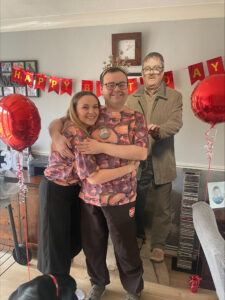Conditions that threaten women’s lives in childbirth & pregnancy
Sophie
 Hello, I am Sophie, my older brother has Learning Disabilities, Autism and a rare neurological condition known as KIF1a.
Hello, I am Sophie, my older brother has Learning Disabilities, Autism and a rare neurological condition known as KIF1a.
This film focuses on my story growing up to early adulthood as a secondary carer for my brother. I tried to keep the story as positive as possible as it’s often hard to do so in day to day life.
Our futures as ‘sibs’ are unpredictable, but I hope that others can relate to my story and find comfort in knowing that they are not alone.
Copyright © 2024 University of Oxford. All rights reserved.


